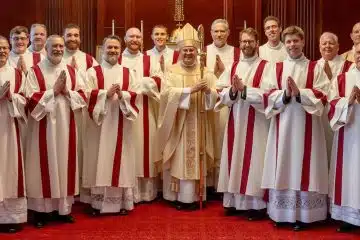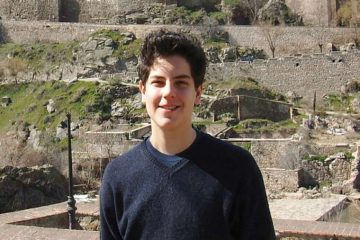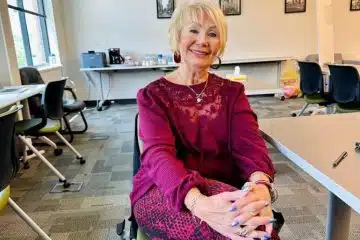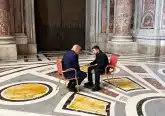St. Rita assistant principal attends Vatican conference
Wednesday, January 6, 2010
By Eileen Connelly, OSU
ARCHDIOCESE — A local educator recently traveled to Rome to meet Pope Benedict XVI and discuss the importance of the Catholic Church’s ministry to the deaf.
Maryann Barth, assistant principal at St. Rita School for the Deaf, was one of the presenters at a Vatican conference held Nov. 19-21. The Pontifical Council for Health Care Ministry dedicated its 2009 annual conference to the condition, needs and experiences of deaf people, including deaf religious and the laity and their families.
The theme of the gathering, “Ephpatha: Deaf People in the Life of the Church,” recalls the Aramaic word meaning “be opened,” which Jesus used to heal a deaf man.
 |
| Maryann Barth, assistant principal at St. Rita School for the Deaf, poses with Father Charlie Dittmeier, a colleague who ministers in Cambodia. (Courtesy photo) |
Barth, who was born hearing but is now deaf, hails from St. Jude Parish in Bridgetown and is a graduate of Mother of Mercy High School. She went on to attend Thomas More College, graduating with a bachelor of educational studies degree, and Gallaudet University in Washington, D.C., where she earned a master’s degree in counseling.
Barth also did post-graduate work in mental health counseling at Xavier University. She has worked with the deaf community in various capacities since 1977, as case manager, teacher, consultant and counselor.
On staff at St. Rita’s for the past 20 years, Barth said the most rewarding aspect of her ministry is simply, “being here every day.”
“St. Rita School is such a unique place,” she said. “We are like a mini-United Nations; all are welcomed and accepted. It’s rewarding to come to work here and know that we are touching the future by teaching, guiding and supporting our students.”
Barth was asked to submit her name and vita to the Vatican as a potential conference presenter by the U.S.- and U.K-based International Catholic Foundation for the Service of Deaf Persons, which helped organize the event. She was one of two people from the United States chosen to present.
“I was actually in shock,” Barth said of receiving the call that she had been selected. Other speakers from around the world included religious and laypeople who are deaf, those who work with deaf people either in the church or society and people who are in charge of pastoral programs that deal with health care issues. The talks examined the medical, psychological and social aspects of deafness, as well as programs that foster the participation of the deaf in the life of the church and wider community.
More than 520 people were in attendance, 88 of them deaf, representing 66 different countries, according to Barth. The audience was comprised of cardinals, bishops, priests, women religious, doctors, psychologists, psychiatrists, teachers, professors, counselors, parents and one young boy.
During her presentation, titled “The Psychological World of Deaf People,” Barth’s message was that deafness has two perspectives — cultural and pathological. “I explained both,” she said. “The summation of my talk was to accept deaf people for who they (we) are and not what they (we) are . . . God makes no mistakes.”
She described audience reaction to her talk as “interesting. Some of the presenters were taking the pathological approach, that deafness is something in need of being cured, and my approach was completely opposite. Basically it was an ‘ah-ha’ moment in that it was a completely different approach to perceiving deafness — that it’s okay to be deaf . . . it is a way of life.”
Barth’s experience at the Vatican also included an audience with the pope, who addressed conferencegoers and presenters in the Clementine Hall of the papal palace. During the meeting the pontiff lamented the lack of public programs and measures to address the needs of deaf people and a lack of even basic healthcare, which may prevent hearing impairment.
He called the ongoing prejudice and discrimination against the deaf “deplorable and horrible,” and praised those groups and individuals who promote the rights of the deaf, especially Catholic initiatives that offer education and assistance aimed at developing the full potential of deaf people.
Conference participants gave 12 recommendations to the pope on how the church can better and more effectively minister to the deaf, Barth said. These include each archdiocese and diocese having formal deaf ministries, along with at least one priest who can sign fluently and serve as the contact person for sacraments. Also recommended was that seminarians in every diocese learn sign language and take sensitivity classes in deaf culture.
“Basically, we asked that all that is afforded to hearing people in the church structure be afforded to deaf people,” Barth said, noting that the pope accepted the recommendations with follow-up planned after the first of the year.
Barth found the conference as a whole beneficial on a number of levels — seeing 16 sign languages in use, knowing that all the feature presentations will be published in a book, learning new signs and collaborating with other deaf professionals from around the world.
“That is the benefit for me and hopefully St. Rita,” she said. “A young Italian boy, Matteo, is now corresponding with me via email, and hopefully we will set up pen-pal type of interaction with students from St. Rita and his class.”
Eileen Connelly, OSU, can be reached at [email protected].













